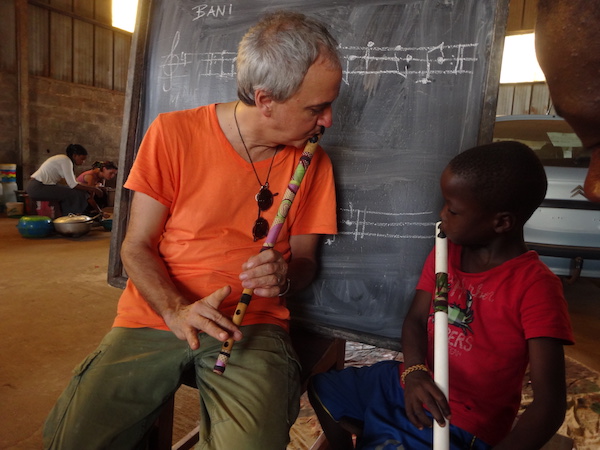Jan 13, 2026 2:09 PM
More Trump-Kennedy Center Cancellations
The fallout from the renaming of the John F. Kennedy Center for the Performing Arts to include President Donald…

Sylvain Leroux helms L’Ecole Fula Flute, an alternative school in Guinea that aims to teach students from ages 6 to 20 academic fundamentals, as well as music.
(Photo: L’Ecole Fula Flute)In a cinderblock schoolhouse with a corrugated tin roof in Conakry, Guinea, reeds specialist Sylvain Leroux is opening new horizons of musical literacy for more than two dozen young students—and future generations.
Seven years ago, having made a simple but inspired modification to the age-old three-holed flute of the West African Fula (or Peul) people, Montreal-born, New York City-based Leroux instituted a free training program in a country mostly lacking formal arts education.
Thanks to his Kickstarter fund-raising efforts, production of two albums—Les Enfants de Tyabala (2014) and Tyabala (2019)—and multiple videos, Leroux’s L’Ecole Fula Flute has become an alternative school with a staff of eight. Its mission is to teach boys and girls from ages 6 to 20 academic fundamentals, as well as how to approach the entire 12-note chromatic scale of Western music on an instrument previously capable of producing a more limited number of pitches.
“It’s a hollow vine,” Leroux said of the material from which he has hand-crafted both traditional models and the six-holed chromatic tambin he’s developed and patented. “You have to go into the bush to harvest it. They grow like cones in marshes along the Niger River, with dangerous barbs and snakes nesting in them.”
Typically about two feet long, decorated with shells and very lightweight, the transversely blown tambin has an embouchure made of a beeswax substance. It presents conceptual and technical challenges.
“The Fula flute that works best is pitched to F,” Leroux explained, “but balafons are always in C, so there would be an issue with B-flat. I’d use half-hole [fingering techniques] or fake it, but one day I looked at an A-flat flute and realized if I moved the holes and added some more I might have the whole thing. I tried it, and I was right. This was in 2011. I’d been playing Fula flute since 1995, when I first went to Guinea, so this blew my mind. And it became the genesis of the school.”
Conakry musicians led Leroux to a government-funded community organization willing to try his idea. After being there for three weeks, then four months, he realized he couldn’t stay year-round, so he enlisted other teachers. L’Ecole Fula Flute now offers training six days a week, 8 a.m. to 6 p.m., in percussion, kora, acting, dancing, songwriting and arranging besides traditional and chromatic tambin, and academic topics. When engaged in fundamentals, pupils sit at desks. When learning music, they gather on a slightly raised stage in the round.
Back home in New York, Leroux has played tambin in Karl Berger’s Creative Music Orchestra and with Guinean ex-pat Bailo Bah, a Fula flute virtuoso. And he’s recently organized a quartet with a percussionist who doubles on balafon, an electric bassist and an accordionist, for cross-cultural purposes.
“I want to play standards and some classical music on the Fula flute, so people can see if they can accept the sound of it with music that’s familiar,” said Leroux. “Some people in the intelligentsia love the Fula flute’s sound and tradition, but when they hear Bach or Monk on it, they think it’s been denatured. African people don’t have that reaction—on the contrary.” DB

Belá Fleck during an interview with Fredrika Whitfield on CNN.
Jan 13, 2026 2:09 PM
The fallout from the renaming of the John F. Kennedy Center for the Performing Arts to include President Donald…

Peplowski first came to prominence in legacy swing bands, including the final iteration of the Benny Goodman Orchestra, before beginning a solo career in the late 1980s.
Feb 3, 2026 12:10 AM
Ken Peplowski, a clarinetist and tenor saxophonist who straddled the worlds of traditional and modern jazz, died Feb. 2…

The success of Oregon’s first album, 1971’s Music Of Another Present Era, allowed Towner to establish a solo career.
Jan 19, 2026 5:02 PM
Ralph Towner, a guitarist and composer who blended multiple genres, including jazz — and throughout them all remained…

Rico’s Anti-Microbial Instrument Swab
Jan 19, 2026 2:48 PM
With this year’s NAMM Show right around the corner, we can look forward to plenty of new and innovative instruments…

Richie Beirach was particularly renowned for his approach to chromatic harmony, which he used to improvise reharmonizations of originals and standards.
Jan 27, 2026 11:19 AM
Richie Beirach, a pianist and composer who channeled a knowledge of modern classical music into his jazz practice,…